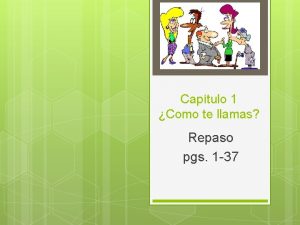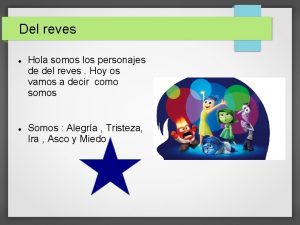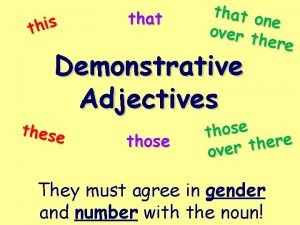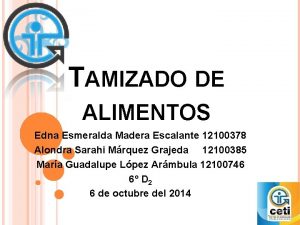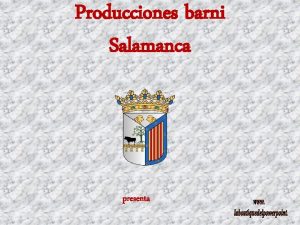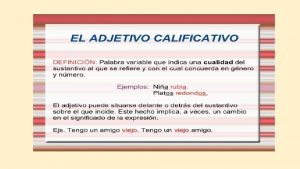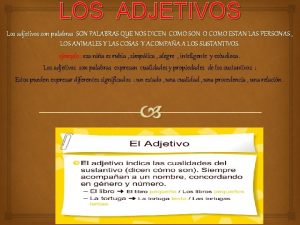ADJETIVOS REPASO Cudate Son camaleones esos adjetivos Hola
















- Slides: 16

ADJETIVOS - REPASO ¡Cuídate! Son camaleones esos adjetivos Hola, amigos. Soy Carlos, el camaleón.

Number & Gender or. . . Como decimos en Boston y otros lugares cercanos. . . Numba & Genda ” “Numba

¿Estamos de acuerdo? (Are we in agreement? ) When we want to describe things (modify nouns), we typically rely on adjectives. Those guys are tricky, though, because not only do we learn them as new vocabulary, but we have to take special care with their endings. Carlos el Camaleón would remind us that we need to pay attention to the noun that it’s all about. Let’s take a look at some examples:

Mi casa Es amarilla, grande, bonita y nueva. Hola, otra vez. Soy yo, Carlos. Because “casa” is singular & feminine, the adjectives “agree” by changing their ending.

Todos mis alumnos son. . . corteses respetuosos amistosos trabajadores bondadosos y sinceros

There is a pattern When you learn a new word (in this case, an adjective), pay close attention to the dictionary spelling of it because its type of ending leads us to treat it in a particular way. Let’s learn the patterns. . .

Ends in “o” Four possibilities: -o -a -os -as Take the adjective “bondadoso” Mi abuelo es bondadoso. Mi abuela es bondadosa, también. Mis abuelos son bondadosos. Incluso mis bis-tías son bondadosas.

A ti te toca Compasivo Elena es _______. Sus hermanas son _______, también. A veces, su hermano no es _______. Sus padres siempre son _______.

A ti te toca Compasivo Elena es compasiva. Sus hermanas son compasivas, también. A veces, su hermano no es compasivo. Sus padres siempre son compasivos.

Ends in “e” Only 2 endings (singular & plural) -e -es u. Ese niño es muy desobediente. u. Uds. son inteligentes.

Ends in consonant Two types: Most end in one of two ways: Consonant + “-es” Antonio es leal. Anita es leal, también. Los dos son leales.

Ending in “-z” Singular (both masc. & fem. ) = -z Plural (both masc. & fem. ) = -ces Mi hermano Bob es muy capaz en la carpintería. De hecho, mis hermanos Kevin y Bob son muy capaces.

n ” & “rr” Consonants such as “n Many adjectives that relate to personality and that end in “n” or “r”, have four forms: -n -na -nes -nas (maculine/singular) (feminine/singular) (masculine/plural) (feminine/plural)

A ti te toca - ¿cómo se dice? 1 2 3 4 5 6 7 8 Anita es _______. (funny) Su novio es _______ (charming) Pepe y Tito son ______. (cautious) La gata es ______. (sleepy-head) Esos señores son ______. (disagreeable) Tus sobrinas son ______. (adorable) Ellas son ______. (hardworking) Tus bis-abuelos son ______. (charming)

A ti te toca - ¿cómo se dice? 1 2 3 4 5 6 7 8 Anita es divertida. (funny) Su novio es encantador. (charming) Pepe y Tito son cautos. (cautious) La gata es dormilona. (sleepy-head) Esos señores son desagradables. (disagreeable) Tus sobrinas son adorables. (adorable) Ellas son trabajadoras. (hardworking) Tus bis-abuelos son encantadores. (charming)

¡Lo hiciste! No es tan difícil cuando entiendes las reglas (rules).
 Hola formal
Hola formal Hola hola hola
Hola hola hola Hola hola hola
Hola hola hola Como te llamas formal or informal
Como te llamas formal or informal Son los resultados principales
Son los resultados principales Del reves personajes
Del reves personajes Hola amores
Hola amores Las tardes
Las tardes Hola mi amigos y amigas
Hola mi amigos y amigas Buenas tardes muchacha
Buenas tardes muchacha Hola mami
Hola mami Mi viejo mi amigo
Mi viejo mi amigo Esos no aquellas sandalias
Esos no aquellas sandalias Intentalo los paises aquel
Intentalo los paises aquel Que canten los niños letra
Que canten los niños letra El colegio poco me enseño
El colegio poco me enseño Cernido de repaso
Cernido de repaso



